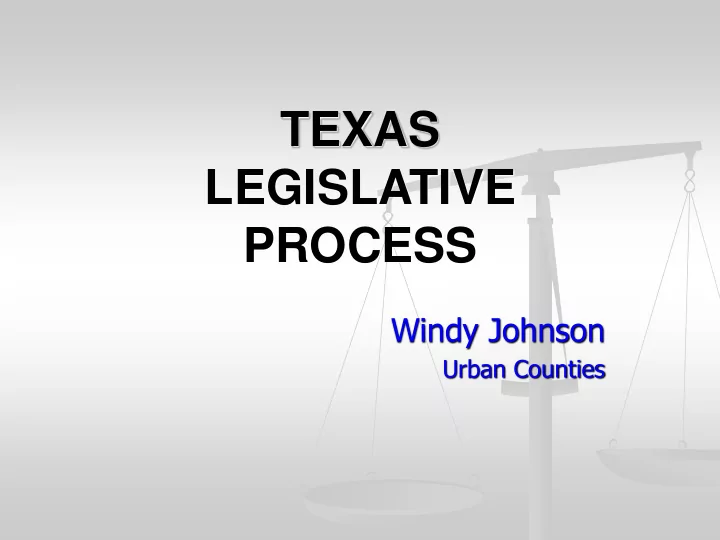

TEXAS LEGISLATIVE PROCESS Windy Johnson Urban Counties
I’m Just a Bill
How a Bill Becomes a Law Bill is introduced in the Bill is introduced in the House Senate Bill is referred to Senate Committee by the Lt. Gov., Bill is referred to House Committee by the Speaker, where it may be amended where it may be amended Bill is heard in public hearing in Bill is heard in public hearing in the the committee committee If the bill passes through the If the bill passes through the committee, committee, by a 3/5 vote, it may it goes to calendars committee for be sent to the floor for debate scheduling for House floor debate Bills is brought to the Senate floor for debate where it may be Bills is brought to the House floor for debate where it may be amended amended If passed by majority vote, the If passed by majority vote, the bill is bill is sent to the House sent to the Senate
Sounds SO easy!
140 days every 2 years…
What Actually Happens?
The Real Process of How a Bill Becomes Law
How to Pay for It?
THE BUDGET PROCESS: FOUR PHASES The process can be divided into four major phases, each involving numerous discrete steps: Review and Planning Approval by Legislative Implement and Comptroller Action and Monitor Proposal and Governor
PLANNING AND PROPOSAL The Governors Office and the Legislative Budget Board (LBB)develop an overall budget strategy. Each agency prepares their strategic plan and submits it to the Governors Office and LBB. Each agency prepares a Legislative Appropriation Request, including any exceptional items. LBB prepares a draft of the general appropriations bill.
LEGISLATIVE ACTION Committee hearings are held and the bills are Comptroller “marked up”. provides Budget Revenue Estimate The (BRE). appropriations bill is filed in both Both chambers houses of the must approve legislature. with a up or The bill is down vote. referred to a conference Bill comes to the committee to floor of the resolve chamber for differences. debate and ultimately approved.
IMPLEMENTATION AND MONITORING Comptroller certifies Sent to the Governor LBB Monitors
Deadlines!
Chance of Passing is Slim
How Can you Keep Up? When the legislature is in session, the Texas Legislature Online (TLO) home page will include the time that the house and senate are scheduled to convene each day. Methods to view and keep track of introduced legislation include: Legislative Reports - View a list of bills that have been filed in the house or senate. Bill Status - View the current status and legislative history for a bill. Text Search - Find bills with specific content. Subject Search - Find bills on a specific subject using the bill search or the subject index
How to Use Texas Legislature Online The MyTLO section of the website offers personalized viewing of legislative content. It offers: Bill List: A custom list of bills created by you. Bill Alert: Receive e-mail notification when bills on this custom list have selected significant actions added. Bill Subject: Receive alerts when bills are assigned a specific subject. Other alerts : Receive e-mail notification when selected calendars, committee hearing notices, committee minutes are posted, or the house/senate adjourn.
TLO….
Tips to Lobby Legislature Get to know your One issue at a Start with a letter audience. time. or phone call. Know your issue and bring Use personal Offer solutions. effective anecdotes. handouts. Build a Act locally. Timing. relationship.
All Bills Start as an Idea
“Egg -cellent" Legislation not to Egg-nore! Senate Bill 1620, bars cities and towns from banning six or fewer backyard chickens . Died in the House
It is illegal to milk another person’s cow.
Hog Hunting From Hot Air Balloons House Bill 3535, states that a qualified landowner or landowner’s agent may contract to participate as a hunter or observer in using a hot air balloon to take depredating feral hogs or coyotes under the authority of a permit. It’s now legal to shoot feral hogs and coyotes from a hot air balloon in Texas, as strange as that sounds.
Regulating Autonomous Vehicles in Texas Senate Bill 2205 permits the Texas Department of Public Safety (DPS) to govern the operation of automated motor vehicles, and prohibits political subdivisions (e.g., cities, towns, and districts) and state agencies from regulating the operation of such vehicles. The law allows driverless vehicles to be tested on Texas roads, and the measure lays the groundwork for these vehicles to someday be driven/produced in the state by allowing continued testing.
Ban on Texting & Driving House Bill 62, prohibits drivers on public roads from using a wireless communication device (i.e., a cell phone) to read, write, or send an electronic message while operating a motor vehicle. Texting and driving in Texas will be punishable by a fine of $25-$99, which raises to $100-$200 for any subsequent offenses. This new law will preempt all “texting and driving” ordinances previously passed by cities, but does not preempt city ordinances which go beyond texting while driving (i.e., hands- free ordinances). The law also states that if a car accident caused by texting and driving results in the death or serious bodily injury of another person, the offender can be charged with a Class A misdemeanor punishable by a fine not to exceed $4,000 and confinement in jail for a term not to exceed one year (in addition to any other charges/punishments).
Recommend
More recommend